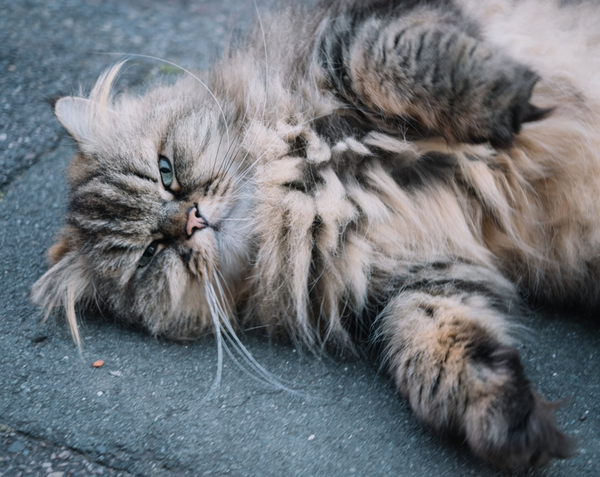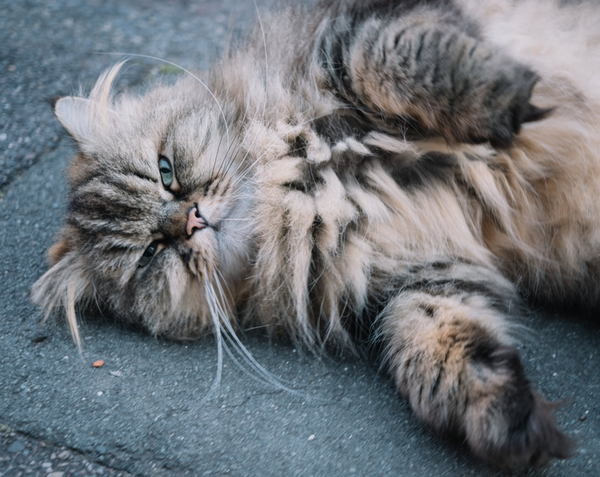If you suffer from allergies but still love cats, owning a Persian cat can be quite challenging. These beautiful long-haired felines are known for producing more allergens compared to other cat breeds, which often triggers allergic reactions in susceptible individuals. However, there are coping strategies that can help you coexist with your furry friend. From regular grooming and using HEPA air filters to creating allergy-free zones in your home, this article will provide you with practical tips to minimize allergy symptoms and maximize the joy of owning a Persian cat. So, if you’re looking for ways to enjoy the companionship of these majestic creatures without sneezing your way through, read on and discover effective coping strategies for Persian cat allergies.
Understanding Allergies
What are allergies?
Allergies are a common health issue that occur when the immune system overreacts to substances that are usually harmless. These substances, known as allergens, can trigger a range of symptoms, from mild discomfort to severe reactions. Allergies can develop at any age and can affect different parts of the body, including the respiratory system, skin, and digestive system.
How do allergies occur?
Allergies occur when the immune system mistakenly identifies a harmless substance as a threat to the body. When you come into contact with an allergen, such as pollen or pet dander, your immune system releases chemicals, such as histamine, to combat the perceived threat. This immune response leads to the symptoms associated with allergies, such as sneezing, coughing, itching, and swelling.
Common symptoms of allergies
The symptoms of allergies can vary depending on the type of allergen and the individual’s immune response. Some common symptoms include sneezing, coughing, runny or stuffy nose, itchy or watery eyes, skin rashes or hives, and gastrointestinal issues like diarrhea or vomiting. In severe cases, allergies can cause anaphylaxis, a life-threatening reaction that requires immediate medical attention.
Different types of allergies
There are various types of allergies, each triggered by different allergens. Some common types of allergies include:
- Seasonal allergies: Also known as hay fever or allergic rhinitis, these allergies are triggered by outdoor allergens, such as pollen from trees, grasses, and weeds.
- Food allergies: This type of allergy occurs when the immune system reacts to certain proteins in food, such as peanuts, tree nuts, shellfish, milk, eggs, or wheat.
- Pet allergies: Many people are allergic to pet dander, which consists of tiny flecks of skin, saliva, and urine shed by animals. Cats and dogs are the most common culprits.
- Dust mite allergies: Dust mites are microscopic organisms that live in household dust. Their waste particles can trigger allergic reactions in some individuals.
- Insect sting allergies: Some people may experience severe allergic reactions to insect stings, such as those from bees, wasps, or fire ants.
Persian Cats and Allergies
Are Persian cats hypoallergenic?
Contrary to popular belief, Persian cats are not considered hypoallergenic. While they may produce fewer allergens than some other cat breeds, they can still trigger allergic reactions in sensitive individuals. The allergens in Persian cats are not related to their fur, as many believe, but rather to the proteins found in their saliva, skin, and urine.
Allergens in Persian cats
The allergens in Persian cats primarily come from their saliva, which they deposit on their fur during grooming. These allergens can then become airborne or accumulate on surfaces within the home. Additionally, allergens can be present in the dander, which is composed of dead skin cells shed by the cat, and in the urine of Persian cats.
Why are Persian cats known for causing allergies?
Persian cats are known for causing allergies because they tend to groom themselves more frequently than other breeds. This grooming habit leads to the deposition of saliva on their fur and increases the likelihood of allergens being spread throughout the environment. Additionally, their long, dense coats can trap allergens, making them more difficult to remove from the living space.
Preventing allergies in Persian cats
While it may not be possible to completely eliminate allergies in Persian cats, there are steps that can be taken to reduce allergen exposure. Regular grooming, which includes bathing the cat with hypoallergenic shampoos, can help remove allergens from the fur. Using air purifiers and keeping the home clean and well-ventilated can also help minimize allergen levels. It may also be beneficial to designate certain areas of the home as “allergy-free zones” to provide a space where allergic individuals can seek relief.

Coping Strategies for Allergies
Managing allergies in Persian cat owners
If you are a Persian cat owner with allergies, there are several strategies you can employ to manage your symptoms. Taking allergy medications, such as antihistamines or nasal sprays, can help alleviate sneezing, itching, and congestion. Consult with your healthcare provider to find the medication that suits you best. It is also essential to maintain good overall health, as allergies can be exacerbated by other factors like stress or fatigue.
Reducing exposure to allergens
Reducing exposure to allergens is key for managing allergies in Persian cat owners. Regularly cleaning the home, including vacuuming carpets and upholstery, can help remove allergens from the environment. Using allergen-proof covers on pillows and mattresses can also prevent allergens from accumulating. Additionally, minimizing contact with the cat’s saliva or urine, such as by washing hands after petting or using gloves for cleaning the litter box, can reduce direct allergen exposure.
Tips for cleaning and maintaining a hypoallergenic home
Creating a hypoallergenic home environment can greatly benefit allergy sufferers. Use high-efficiency particulate air (HEPA) filters in your vacuum cleaner and air purifiers to effectively remove allergens from the air. Regularly wash bedding, curtains, and pet bedding in hot water to kill dust mites and remove allergens. Avoid using scented cleaning products, as they may irritate your respiratory system. Maintaining good indoor air quality by opening windows for ventilation can also help reduce allergen levels.
Allergy medications and treatments
In addition to over-the-counter allergy medications, such as antihistamines and nasal sprays, there are other treatment options available for managing allergies. Immunotherapy, commonly known as allergy shots, involves receiving regular injections of small doses of allergens to desensitize the immune system. This can provide long-term relief for some individuals. Consultation with an allergist or immunologist is recommended to determine the most suitable treatment plan based on your specific allergies and medical history.
Allergy-Friendly Persian Cats
Breeds similar to Persian cats that may cause fewer allergies
If you are allergic to Persian cats but still want to enjoy the companionship of a feline friend, there are other cat breeds that may be more allergy-friendly. Some breeds that are considered to produce fewer allergens include the Balinese, Javanese, and Siberian cats. These breeds have been known to produce less Fel d 1 protein, which is a major allergen found in cat saliva and dander.
Choosing an allergy-friendly Persian cat
If you are set on owning a Persian cat despite having allergies, there are certain measures you can take to find a more allergy-friendly individual. Firstly, spend time with the cat before bringing them home to see how your allergies react. Some people may be more tolerant of certain cats than others. Additionally, consider adopting an adult cat instead of a kitten, as adult cats produce fewer allergens. Regular grooming and keeping the home clean will also play a crucial role in minimizing allergens.
Grooming techniques for reducing allergens in Persian cats
Regular grooming is essential for reducing allergens in Persian cats. Brushing the cat’s coat frequently helps remove loose hair, dander, and allergens. Wet wiping or using dander wipes will help remove allergens from the cat’s fur and prevent them from becoming airborne. Bathing the cat with hypoallergenic shampoos can also be beneficial, but be sure to consult with a veterinarian for guidance on proper bathing frequency and techniques.

Allergy Testing and Consultation
Visiting an allergist or immunologist
If you suspect that you have allergies, it is recommended to visit an allergist or immunologist for proper diagnosis and treatment. These healthcare professionals specialize in identifying and managing allergies. They will be able to conduct tests to determine the specific allergens that trigger your symptoms and provide appropriate medical advice. They can also guide you through treatment options, including allergen avoidance, medication, or immunotherapy.
Methods of testing for allergies
Allergy testing involves exposing the body to small amounts of common allergens to see if a reaction occurs. The two primary methods of allergy testing are skin tests and blood tests. Skin tests involve pricking or scratching the skin with a small amount of allergen extract and observing the skin’s reaction. Blood tests measure specific IgE antibodies in the blood to determine an allergic response.
Allergy shots and immunotherapy
For individuals with severe allergies, allergy shots, also known as immunotherapy, may be recommended. This treatment involves receiving regular injections of allergens over a period of time, gradually increasing the dosage. The aim is to desensitize the immune system to the allergens and reduce the severity of allergic reactions. Allergy shots can provide long-term relief and may be particularly beneficial for those who do not respond well to medications or have difficulty avoiding allergens.
Natural Remedies for Allergies
Herbal supplements for relieving allergy symptoms
Several herbal supplements have been traditionally used to relieve allergy symptoms. Some herbs with potential anti-allergic properties include butterbur, stinging nettle, and quercetin. However, it’s important to note that herbal supplements may not be suitable for everyone and can interact with certain medications. Consult with a healthcare professional before using any herbal supplements to ensure they are safe and appropriate for your specific condition.
Homeopathic remedies for allergies
Homeopathic remedies are based on the principle of “like cures like” and involve using highly diluted substances to stimulate the body’s natural healing abilities. Some common homeopathic remedies for allergies include Allium cepa for watery eyes and runny nose, Sabadilla for sneezing and itching, and Natrum muriaticum for nasal congestion. As with herbal supplements, it is crucial to seek guidance from a qualified homeopath before using homeopathic remedies.
Using essential oils for allergies
Essential oils, such as peppermint, eucalyptus, and lavender, are often used for their potential therapeutic properties, including relieving allergy symptoms. However, it’s important to note that essential oils can be potent and may cause adverse reactions in some individuals. Always dilute essential oils before use and perform a patch test to check for any allergies or sensitivities. Consult with a qualified aromatherapist or healthcare professional for guidance on the safe use of essential oils for allergies.

Managing Allergies in Children
Persian cats and childhood allergies
Childhood allergies can make it challenging for children to coexist with pets, including Persian cats. The allergens present in Persian cats’ saliva, dander, and urine can trigger allergic reactions in sensitive children. It is essential to monitor your child’s symptoms and consult with a pediatric allergist for accurate diagnosis and guidance on managing allergies in children.
Teaching children to cope with allergies
Empowering children with allergy management skills can help them cope with allergies effectively. Teach them proper hand hygiene, including washing hands after touching the cat, and discourage rubbing their eyes or snuggling closely with the cat. Offer age-appropriate explanations about allergies, ensuring they understand the importance of avoiding allergen exposure. Encourage open communication, so children feel comfortable expressing their discomfort and seeking support when needed.
Allergy-proofing the home for kids
Creating an allergy-friendly environment at home is crucial for children with allergies. Keep the child’s bedroom as allergen-free as possible by using allergen-proof bedding covers, regular vacuuming, and minimizing soft furnishings that can accumulate allergens. Establish “no-cat zones” such as the child’s bedroom or playroom to provide a safe retreat. Regularly clean the child’s toys and washable surfaces to minimize allergen buildup. Creating a healthy and well-ventilated living space can also contribute to better allergy management.
Living with Allergies and Persian Cats
Adjusting to life with allergies
Living with allergies, especially when owning a Persian cat, may require adjustments to your lifestyle and daily routines. Accepting that allergies are a part of your life and adopting coping strategies, such as taking allergy medications as needed, can help you manage symptoms effectively. Educate yourself about allergen avoidance strategies and commit to regular grooming and cleaning routines to minimize allergen exposure. Focus on the joy and companionship your Persian cat brings to your life while taking responsible steps to prioritize your health.
Seeking support from other cat owners with allergies
Connecting with other cat owners who also have allergies can provide support and valuable insights. Online forums, social media groups, or local allergy support groups can be excellent resources for sharing experiences, discussing coping strategies, and seeking advice from those in similar situations. They can offer empathy, understanding, and practical solutions based on firsthand experiences.
Creating an allergy-friendly environment
Creating an allergy-friendly environment goes beyond managing allergens related to Persian cats. Implementing general allergy management practices can benefit all members of the household. Regular cleaning and maintenance routines, good ventilation, and using allergen-reducing products, such as HEPA filters, can create a healthier living space. Minimizing exposure to other common allergens, such as dust mites or pollen, can also contribute to a more comfortable environment for everyone.

Tips for Allergic Visitors
Preparing your home for guests with allergies
If you anticipate having guests with allergies, taking steps to prepare your home can help ensure their comfort. Before their arrival, thoroughly clean the house, paying particular attention to areas where allergens tend to accumulate, such as carpets, upholstery, and curtains. Use hypoallergenic cleaning products to minimize potential irritants. Consider using allergen-proof covers on furniture, pillows, and mattresses to create a barrier against allergens. It’s also helpful to remove or greatly reduce the presence of potential allergens, such as scented candles or air fresheners.
Creating a designated allergy-free area
Designating an allergy-free area in your home can provide a space where allergic guests can seek relief from their symptoms. Ideally, this area should be free from any potential allergens, including pets. Thoroughly clean and minimize potential allergens in this space, ensuring it remains a safe haven for guests with allergies. Communicate the availability of the allergy-free area to your guests and encourage them to use it whenever they need a break from potential allergens.
Sharing information about allergens with visitors
Openly communicating with your guests about potential allergens in your home is crucial in ensuring their comfort and well-being. Prior to their visit, inform them about the presence of Persian cats and discuss any precautionary measures you have taken to reduce allergen exposure. Offer to make adjustments, such as keeping the cats in restricted areas or implementing stricter cleaning routines, if it will help alleviate their symptoms. Being proactive and considerate can go a long way in creating a welcoming environment for allergic visitors.
Future Research and Developments
Advancements in hypoallergenic cat breeding
Researchers are continually exploring genetic and breeding techniques to develop cat breeds with reduced allergenic properties. Through selective breeding programs, some progress has been made in developing hypoallergenic cats that produce fewer allergens. However, it’s important to note that the concept of hypoallergenic cats is still relatively new, and more research is needed to fully understand and validate these claims.
New treatments for cat allergies
Advancements in medical research offer hope for new treatments for cat allergies. From novel medications targeting specific allergic reactions to innovative immunotherapy approaches, researchers are working towards finding safer and more effective options for allergy management. Stay informed about the latest developments in medical research and consult with healthcare professionals to explore the most up-to-date treatment options available.
Studies on the impact of cat allergies on human health
Researchers recognize the need for further studies to explore the impact of cat allergies on human health. Allergies can have significant physical and emotional effects on individuals, and understanding the full scope of these impacts can help researchers develop more comprehensive treatment and management strategies. By participating in research studies, individuals with cat allergies can contribute to advancing scientific understanding and improving the lives of allergy sufferers.

